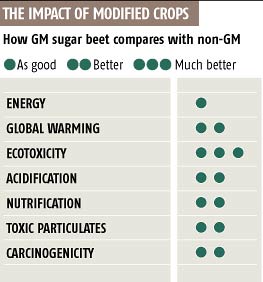
Genetically modified sugar beets are much more environmentally friendly than regular beets. This is the conclusion of a new analysis, which is the first to measure the broad impact of genetically modified crops, including their contribution to global warming, the extent of their damage to the ozone layer and their toxicity to marine life.
"Overall, herbicide-resistant GM beets are about 15 to 50 percent better for the environment, depending on which area the effect is measured," says Richard Phipps of the School of Agriculture at the University of Reading in Berkshire, England.
Phipps and his colleague Richard Bennett say that the benefit of genetically modified crops is mainly due to the fact that farmers spray herbicides and pesticides on these crops less frequently. Thus saving a lot of fuel for tractors and reducing the impact on global warming for example.
The findings contradict the "Scale Assessments of Agricultural Crops" recently completed in England. These are the largest experiments conducted to compare the effects of genetically modified crop systems and conventional crops on wildlife in farmland.
In these evaluations genetically modified rapeseed and sugar beet seeds proved to be more harmful than their non-transgenic counterparts. Corn with resistance to a particular type of herbicide fared better than non-GM corn, but that may become irrelevant as the European Union plans to ban the use of this herbicide on regular corn.
In Phipps and Bennett's analysis, they gathered information from publications in the literature, farmers, and actual experiments on conventional and transgenic beets.
They measured various indicators, set according to internationally approved standards, including the energy used to produce herbicides and the amount of fuel used by tractors to spray crops. The analysis also catalogs all the physical resources that are consumed and the impact of any pollution.
Phipps says that their experimental method, which they call "Life-Cycle Analysis", can easily be used to test the environmental impact of other agricultural systems. "There is no reason not to apply the same methodology to organic agricultural systems or those that do not use plowing."
He claims that the analysis is more holistic and provides a broader picture than the assessments, which only examined the effects on wildlife.
"We do not underestimate the value of the evaluations, which were brilliant," he says. "We only claim that they only tested one component of the system."
But Les Fairbank, the coordinator of the assessments, says that each environmental damage may have a different effect on the rural areas. Helping birds recover may be much more significant than saving fuel for tractors, for example.
Phipps presented his initial findings last week to the government's advisory committee on releases into the environment of genetically modified plants in England.
Link to the original article in "New Scientist"
He knew genetic engineering - plants
https://www.hayadan.org.il/BuildaGate4/general2/data_card.php?Cat=~~~707274824~~~27&SiteName=hayadan
